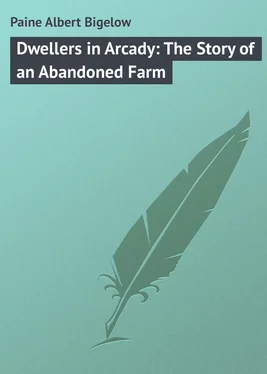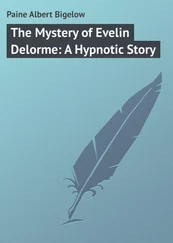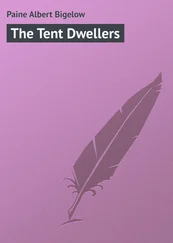Albert Paine - Dwellers in Arcady - The Story of an Abandoned Farm
Здесь есть возможность читать онлайн «Albert Paine - Dwellers in Arcady - The Story of an Abandoned Farm» — ознакомительный отрывок электронной книги совершенно бесплатно, а после прочтения отрывка купить полную версию. В некоторых случаях можно слушать аудио, скачать через торрент в формате fb2 и присутствует краткое содержание. Жанр: foreign_prose, на английском языке. Описание произведения, (предисловие) а так же отзывы посетителей доступны на портале библиотеки ЛибКат.
- Название:Dwellers in Arcady: The Story of an Abandoned Farm
- Автор:
- Жанр:
- Год:неизвестен
- ISBN:нет данных
- Рейтинг книги:3 / 5. Голосов: 1
-
Избранное:Добавить в избранное
- Отзывы:
-
Ваша оценка:
- 60
- 1
- 2
- 3
- 4
- 5
Dwellers in Arcady: The Story of an Abandoned Farm: краткое содержание, описание и аннотация
Предлагаем к чтению аннотацию, описание, краткое содержание или предисловие (зависит от того, что написал сам автор книги «Dwellers in Arcady: The Story of an Abandoned Farm»). Если вы не нашли необходимую информацию о книге — напишите в комментариях, мы постараемся отыскать её.
Dwellers in Arcady: The Story of an Abandoned Farm — читать онлайн ознакомительный отрывок
Ниже представлен текст книги, разбитый по страницам. Система сохранения места последней прочитанной страницы, позволяет с удобством читать онлайн бесплатно книгу «Dwellers in Arcady: The Story of an Abandoned Farm», без необходимости каждый раз заново искать на чём Вы остановились. Поставьте закладку, и сможете в любой момент перейти на страницу, на которой закончили чтение.
Интервал:
Закладка:
Luther was an expert at chaining out boulders, and he loved the job. When we got one to the brook, and after great prying and grunting finally boosted it in with a mighty splash, Luther would wave his arms, jump about, and laugh like the high-hearted boy that he was. Those were lovely days.
CHAPTER TWO
I
We carried down a little hair trunk
I was in the midst of the improvements mentioned when the family – that is to say, Elizabeth and the girls – arrived on the scene. It was a fine August day – the 21st, to be quite exact – and I borrowed a horse and light wagon from Westbury and drove the three miles of brook and woods and meadow to the station to meet them.
There was just one business house at the station – a general store – and I suddenly found myself deeply interested, in things I had barely noticed heretofore. Why, there was a broom! Sure enough, we would need a broom; also, a rake – that was highly necessary; and a hatchet, and some nails, and a shovel, and a water-pail, and a big galvanized tub, and – by the time the train came it took careful arrangement to fit in the family and the baggage among my purchases. The Pride had to sit on the water-pail, the Joy, aged two, in the galvanized tub, while the Hope, who was seven, sat on a trunk at the back, dangled her legs, waved her arms, and whooped her delight as we joggled along, for the Hope was a care-free, unrestrained soul, and the world to her just a perpetual song and dance.
They were in a mood to take things as they found them; even the Pride, who at twelve was critical, expressed herself as satisfied with the house, and, with the Hope, presently made a dash for the attic, our story of which had stirred them deeply. It was necessary to restrain them somewhat. In the first place, our attic was not a possession to be pawed over by careless and undiscerning childhood. Besides, it was hot up there under the roof, and gray with the dust of years. It was a place for a cool, rainy day and not for a mid-August afternoon.
We carried down a little hair trunk with brass nails in it, and under the shade of one of the big maples the "tribe," as we sometimes call them, spread out the treasures of some little old-fashioned girl who long, long ago had put them away for the last time. There were doll dresses, made of the quaint prints of another day, and their gay posy patterns had remained fresh, though the thread of the long childish stitches had grown yellow with the years. They had very full skirts, and waists that opened in front, and there was an apron with a wonderful bib, and a little split sun-bonnet, probably for every-day wear, also another bonnet which must have been for occasions, for its material was silk and it was one of those grand, flaring coal-scuttle affairs such as fashionable dolls wore a very long time ago.
The doll was not there. Long since she had gone the way of all dolls; but the Pride and the Hope decked their own dolls in the little old wardrobe, and thought it all delightful and amusing, while we watched them with long thoughts, trying to picture the little girl who had one day put her treasures away to become a young lady, and in time a wife, and a mother, and a grandmother, and was now resting on the sunny slope where the road turns, beyond the hill. Later generations of little girls appeared to have added nothing to the hair trunk. Doubtless they had dolls, with dresses and styles of their own, and trunks of a newer pattern, and had scorned these as being a little out of date. Even the Pride and the Hope would not have permitted their dolls to appear in those gowns in public, I think – at any rate, not in the best society – though carefully preserving them with a view perhaps to fancy-dress occasions.
The Joy was not deeply impressed with the hair trunk. Neither its art nor its sentimental value appealed to her. She had passed something more than two years in our society, and during most of this period had imagined herself a horse. A fairly level green place, where she could race up and down and whinny and snort and roll was about all she demanded of life; though she had a doll – a sort of a horse's doll – which at the end of a halter went bounding after her during long afternoons of violence.
For the Joy we brought down from the attic a little two-wheeled green doll-buggy, with a phaeton top and a tongue, and this at once became her chief treasure. She hitched herself to it, flung in her doll, and went racing up and down, checked up or running free, until her round, fat face seemed ready to burst, and it became necessary to explain to her that she had arrived at wherever she was going and must stand hitched in the shade till she cooled off. It was a drowsy occupation that summer afternoon. She was presently sitting down – as much as a horse can sit down – and just a little later was stretched among the long grass and clover, forgetful of check-rein and hitching-post. Later, when the three of them were awake at once, they possessed themselves of the big barn and explored the stalls and tumbled about on the remnant of hay that still remained in one of the mows. Then they discovered the brook, where it flowed clear and cool among the willows at the foot of the door-yard. It was not deep enough to be dangerous, and they were presently wading and paddling to their hearts' content.
The brook, in fact, became one of their chief delights. It was never very warm, but, tempered by August sun and shower, its shady, pleasant waters were as balm to hot bare legs and burning feet. Flowers of many kinds grew along its banks, while below the bridge where it crossed the road there was always a school of minnows eager to be fed, and now and then one saw something larger dart by – something dark, torpedo-shaped, swift, touched with white along its propellers – a trout. There is no end of entertainment in such things. Summer-time, the country, and childhood – that is a happy combination, and a bit of running water adds the perfect touch.
II
Cap'n Ben has an iron door-sill
We did not take full possession of our place immediately. Whatever we had in the way of household effects was in a New York City flat, and one must have a few pots and tin things, even for the simple life. Fortune was good to us: the Westbury household offered us shelter until we were ready to make at least a primitive beginning, and one could not ask better than that. Mrs. Westbury was a famous cook, and Westbury's religion was conveyed in the word plenty. The hospitality and bounty of their table were things from another and more lavish generation. The Joy promptly gave our hosts titles. She called them Man and Lady Westbury, which somehow seemed exactly to fit them.
Each morning we went up to see what we could find to do, and we never failed to find plenty. I don't remember distinctly as to all of Elizabeth's occupations, but I know she has a mania for a broom and a clothesline. I carry across the years the impression of an almost continuous sweeping sound – an undertone accompaniment to my discussion with carpenter and painter – and I see rows of little unpacked dresses swinging in the sun.
One of my own early jobs was to clean the cellar. It was a sizable undertaking, and I engaged Old Pop's Sam to help me. It was a cellar of the oldest pattern, with no step, having an entrance on a level with the road, the same being a "rollway" wide enough to admit barrels of cider and other produce. I don't know how many had been rolled into it during the century or so before we came, but after a casual look I decided that very few had been rolled out. The place was packed to the doors with barrels, boxes, benches, and general lumber of every description.
About the time we got started an audience assembled. Old Nat, who was taking a day off, and 'Lias Mullins, who had a weakness in his back and took most of his days off, drifted in from somewhere and sat on the wall in the shade to give us counsel. Then presently W. C. Westbury drove up and became general overseer of the job. They formed a board of appraisal, with Westbury as chairman. All of them knew that cellar and were intimately acquainted with its contents.
Читать дальшеИнтервал:
Закладка:
Похожие книги на «Dwellers in Arcady: The Story of an Abandoned Farm»
Представляем Вашему вниманию похожие книги на «Dwellers in Arcady: The Story of an Abandoned Farm» списком для выбора. Мы отобрали схожую по названию и смыслу литературу в надежде предоставить читателям больше вариантов отыскать новые, интересные, ещё непрочитанные произведения.
Обсуждение, отзывы о книге «Dwellers in Arcady: The Story of an Abandoned Farm» и просто собственные мнения читателей. Оставьте ваши комментарии, напишите, что Вы думаете о произведении, его смысле или главных героях. Укажите что конкретно понравилось, а что нет, и почему Вы так считаете.












